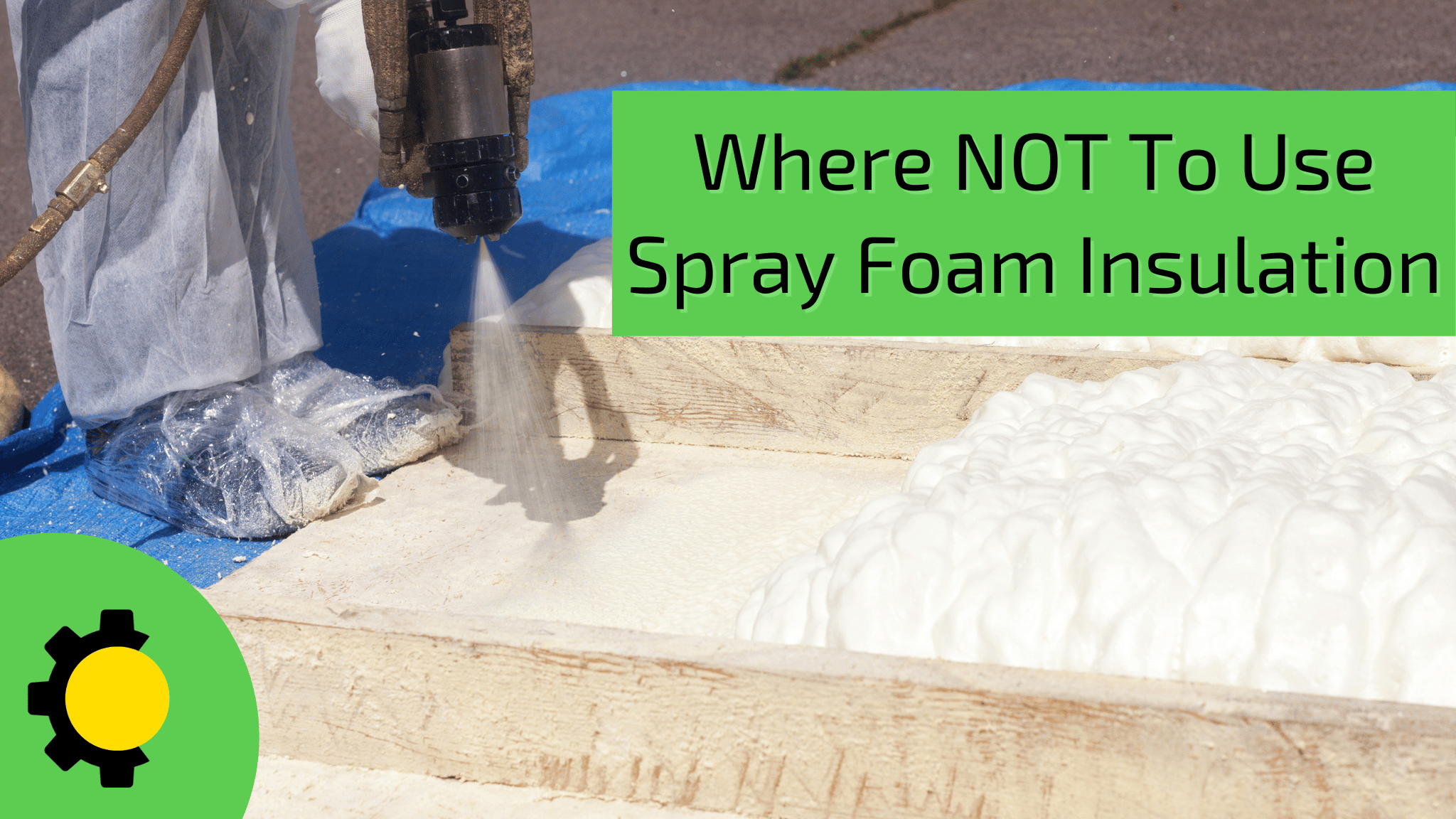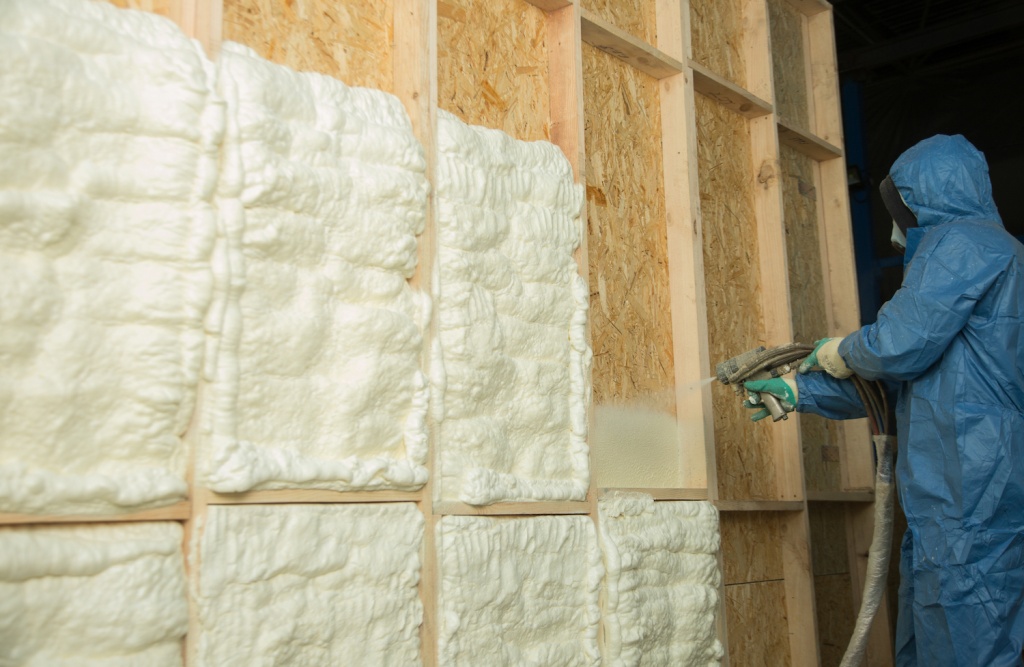How Spray Foam Can Enhance Power Efficiency in Your Home
How Spray Foam Can Enhance Power Efficiency in Your Home
Blog Article
Spray Foam: The Ultimate Solution for Air Sealing and Insulation
Spray foam insulation has become a leading option for reliable air securing and thermal insulation, supplying an unique combination of residential properties that establish it in addition to traditional methods. Its ability to broaden and fill up spaces makes it specifically reliable in stopping air leak, which can dramatically impact energy effectiveness. Comprehending the full scope of its advantages, installment processes, and comparisons with various other insulation kinds is vital for making notified decisions. As we discover these facets, the ramifications for both new constructions and retrofits come to be progressively significant. What factors should affect your option?
What Is Spray Foam?
Spray foam is a functional insulation material that incorporates the principles of air securing and thermal resistance to enhance energy performance in buildings. Made up primarily of polyurethane or various other comparable compounds, spray foam is used as a liquid that broadens upon call with surfaces, producing a strong, continuous layer of insulation. This special building allows it to fill up voids, cracks, and spaces that typical insulation materials may forget, providing a remarkable air seal.
There are 2 main kinds of spray foam: open-cell and closed-cell. Open-cell spray foam is lighter and a lot more flexible, supplying excellent noise absorption and a reduced R-value per inch - Spray Foam. On the other hand, closed-cell spray foam is denser, providing a higher R-value, moisture resistance, and added structural stability to constructing parts
The application procedure generally includes specific devices, ensuring a seamless application that sticks to numerous substratums, consisting of timber, steel, and concrete. This versatility makes spray foam appropriate for both new buildings and retrofitting existing structures. Its capability to create an airtight barrier considerably contributes to decreasing energy consumption and improving interior air top quality, therefore making it a recommended selection amongst home owners and builders alike.
Advantages of Spray Foam Insulation
Among one of the most substantial advantages of spray foam insulation is its outstanding capacity to produce a constant air barrier, which effectively minimizes power loss. Unlike conventional insulation materials, spray foam increases to load cracks and voids, making certain that air leak is drastically minimized. This characteristic not just boosts energy effectiveness yet likewise results in decrease energy costs with time.
Furthermore, spray foam insulation offers superior thermal resistance, adding to a much more stable indoor setting. Its high R-value per inch enables for effective insulation in restricted areas, making it ideal for attic rooms, wall surfaces, and crawl spaces. The moisture-resistant properties of spray foam assistance protect against mold and mildew and mildew growth, advertising much healthier living conditions.
One more important advantage of spray foam insulation is its sound-dampening qualities (Spray Foam). It successfully reduces sound transmission between rooms, producing a quieter and a lot more comfy home setting. The sturdiness of spray foam likewise attracts attention, as it does not droop or settle over time, maintaining its performance throughout its lifespan
Exactly How Spray Foam Works
Comprehending exactly how spray foam insulation works is necessary for valuing its efficiency in air sealing and thermal resistance. Spray foam insulation contains two primary components: isocyanate and polyol resin. When these components are combined, her explanation they undertake a chain reaction that creates the product to broaden quickly, producing a dense foam that fills gaps, splits, and dental caries.
As the foam increases, it sticks to surfaces, forming an impermeable seal that substantially decreases air infiltration. This particular makes spray foam insulation extremely effective at protecting against drafts and wetness penetration, which can bring about energy loss and damages gradually. Additionally, the closed-cell version of spray foam uses exceptional thermal resistance due to its inflexible structure, properly lessening heat transfer.
The one-of-a-kind properties of spray foam permit it to satisfy irregular surface areas, ensuring thorough protection and a smooth barrier. Therefore, spray foam insulation not just improves power performance however likewise adds to boosted interior air quality by reducing the buildup of irritants and toxins. Inevitably, comprehending the auto mechanics behind spray foam emphasizes its function as a premium selection for insulation and air sealing in both household and commercial applications.
Installment Refine Review

Before setup, the room has to be sufficiently cleansed and prepped, ensuring that surfaces are devoid of dust, wetness, and particles. This action is important due to the fact that impurities can compromise adhesion and general performance. When the area is prepared, the application includes mixing both elements of the spray foam, which expands upon contact and fills gaps effectively.
Trained specialists need to perform the installment, using specific equipment to guarantee uniform coverage and optimal density. Safety and security safety measures, including putting on protective gear and making certain correct ventilation, are critical important link throughout this process. After application, the foam typically cures quickly, developing a solid barrier that improves useful source energy effectiveness.
Comparing Spray Foam to Conventional Insulation
When examining insulation options, spray foam insulation stands apart in contrast to traditional materials such as fiberglass and cellulose. Among the primary advantages of spray foam is its superior air securing capacities. Unlike fiberglass and cellulose, which can enable air infiltration, spray foam broadens upon application, loading voids and gaps to develop a closed seal. This leads to boosted power efficiency, as less warmed or cooled air escapes the home, leading to reduced energy expenses.
Furthermore, spray foam supplies a higher R-value per inch than standard insulation types, supplying even more effective thermal resistance in a thinner profile. This particular is particularly valuable in rooms with restricted dental caries deepness. In addition, spray foam is immune to moisture and mold and mildew growth, which can be a significant worry with cellulose and fiberglass, particularly in damp atmospheres.
However, spray foam insulation commonly brings a greater in advance cost than its traditional equivalents. Property owners should consider this first investment versus long-term power financial savings and efficiency benefits. Inevitably, while both insulation kinds serve their objective, spray foam emerges as an advanced option for contemporary insulation demands, specifically in terms of air securing and thermal effectiveness.

Conclusion
In summary, spray foam insulation stands for an extremely effective service for accomplishing ideal air sealing and thermal resistance. Its special homes, including wetness resistance and audio dampening, make it suitable for various applications in both brand-new building and constructions and retrofitting tasks (Spray Foam). The preliminary prices may be higher contrasted to typical insulation materials, the long-lasting advantages, such as considerable energy savings and boosted indoor air top quality, validate the financial investment and emphasize its value in modern-day structure techniques.
Spray foam insulation has actually arised as a leading option for efficient air securing and thermal insulation, supplying an one-of-a-kind combination of residential or commercial properties that establish it apart from conventional approaches.Spray foam is a versatile insulation product that combines the principles of air securing and thermal resistance to enhance energy performance in buildings.When examining insulation options, spray foam insulation stands out in contrast to conventional products such as fiberglass and cellulose. Ultimately, while both insulation types offer their purpose, spray foam arises as an extra advanced solution for modern insulation needs, particularly in terms of air securing and thermal effectiveness.
In summary, spray foam insulation represents a very effective remedy for attaining ideal air securing and thermal resistance.
Report this page